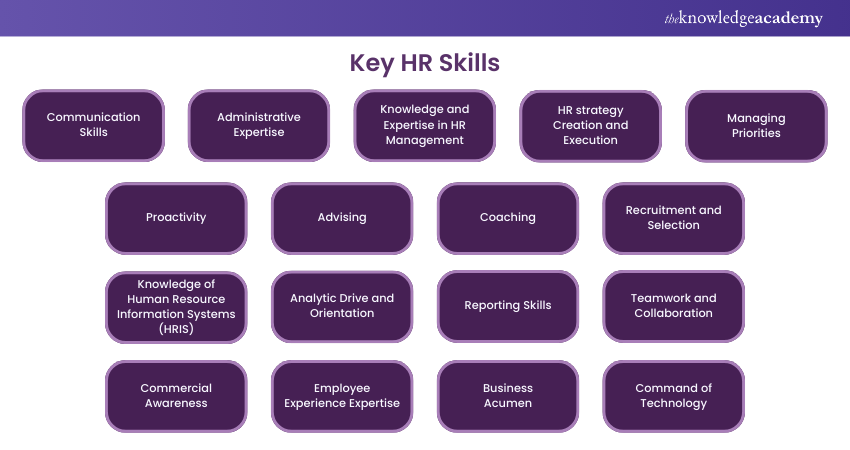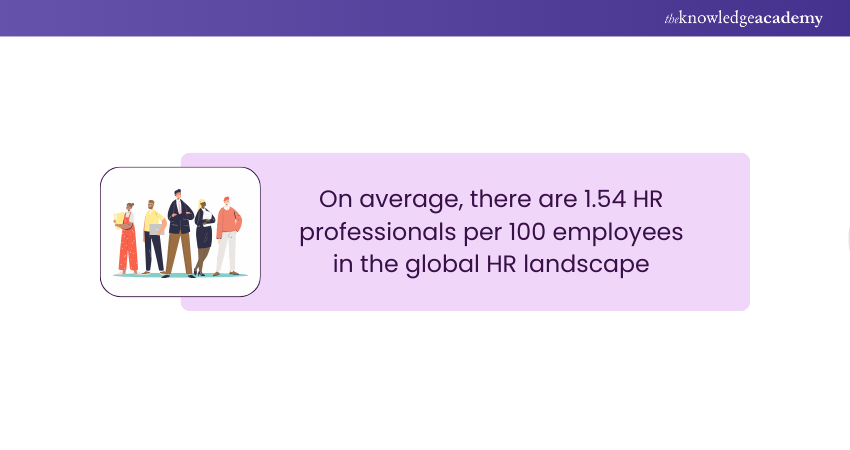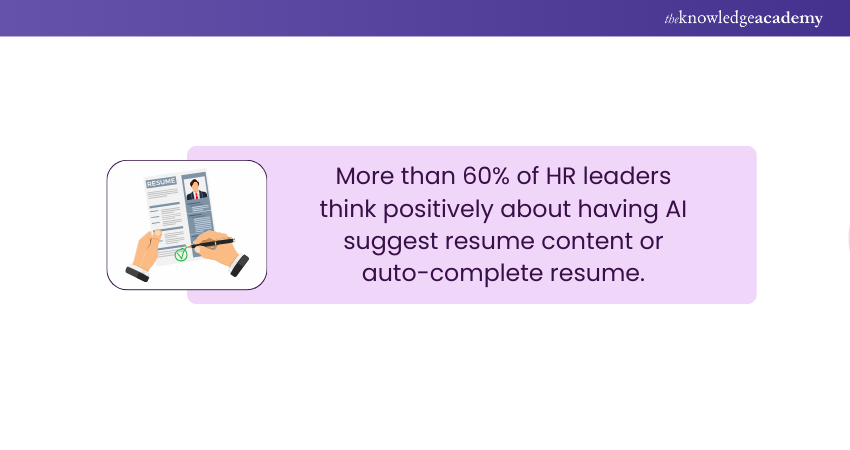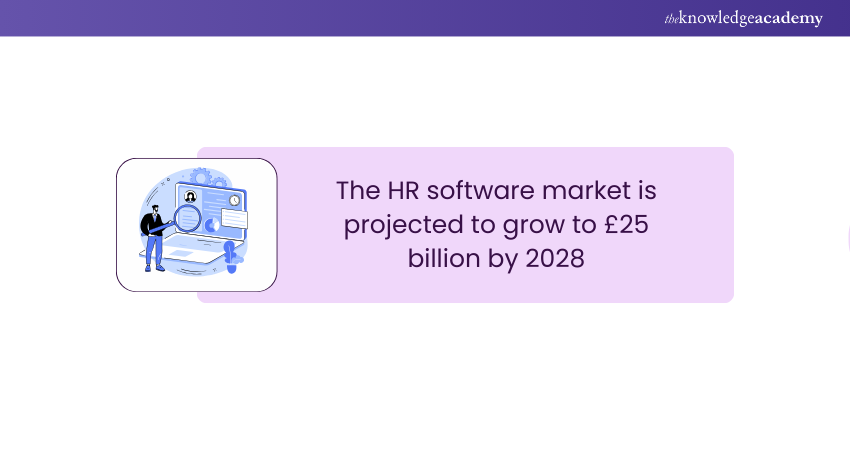We may not have the course you’re looking for. If you enquire or give us a call on 01344203999 and speak to our training experts, we may still be able to help with your training requirements.
We ensure quality, budget-alignment, and timely delivery by our expert instructors.

Human Resources (HR) is far more than just hiring; it’s the heartbeat of a thriving organisation, shaping company culture, driving Talent Management, and streamlining operations. Curious about what it takes to excel in this dynamic field? Look no further!
This blog presents a curated list of 17 essential HR skills, from coaching and reporting to commercial awareness and analytical orientation. Dive in, transform into the strategic powerhouse you’ve always envisioned, and stay ahead in the ever-evolving HR landscape!
Table of Contents
1) What are HR Skills?
2) Key HR Skills
3) Impact of HR Skills
4) Developing HR Skills
5) Conclusion
What are HR Skills?
Professionals in the Human Resources department must equip themselves with diverse skills. HR Skills go beyond administrative tasks and require a deep understanding of people dynamics, leadership, Effective Communication, and more. Before delving into the essential skills, you must understand the multifaceted nature of Human Resources.
HR encompasses various functions including:
1) Employee relations
2) Recruitment
4) Training and development
5) Policy implementation
Each area demands a unique skill set, collectively contributing to an HR Professional's overall effectiveness.
Key HR Skills
Honing the key HR Skills is pivotal for professionals aiming to excel as a HR professional. These skills comprise numerous abilities that enable HR Practitioners to effectively manage people, drive organisational success, and nurture a positive work culture. So, let’s have a detailed look at these Skills for HR:

Communication Skills
Excellent Communication Skills are essential for HR professionals. Clear, concise communication fosters understanding among employees, effectively resolves conflict, and ensures smooth collaboration within the workplace. HR Practitioners must articulate policies, explain benefits, and mediate disputes professionally and empathetically. Communication is a two-way process.
Thus, HR professionals establish trust and credibility through Active Listening and clear expression, facilitating a positive work environment. Whether conveying company policies or addressing sensitive employee issues, adept communication skills are crucial to building rapport, creating harmony, and upholding a respectful workplace atmosphere.
Administrative Expertise
HR professionals with solid administrative expertise are invaluable assets to organisations as they efficiently manage multiple tasks including:
a) Scheduling interviews
b) Processing paperwork
c) Organising training programme
d) Handling employee records
Moreover, attention to detail, Time Management, and accuracy in record-keeping are paramount. Administrative capabilities enable HR departments to function seamlessly, ensuring compliance with regulations and increasing overall productivity.
Knowledge and Expertise in HR Management
HR professionals must possess extensive knowledge and expertise in HR Management to navigate the complexities of employment regulations and nurture a positive workplace environment. This includes:
a) Understanding employment laws
b) Firm grasp on Employee Rights and Responsibilities
c) Understanding company policies
d) Proficiency performance evaluations
e) Expertise in conflict resolution
This expertise ensures the fair treatment of Employees, mitigates legal risks, and elevates employee satisfaction. Thus, it contributes significantly to the company's reputation and success.
HR Strategy Creation and Execution
Developing and executing HR strategies are pivotal roles of HR professionals. Devising comprehensive strategies that align with the company’s objectives and values is fundamental. This involves identifying talent needs and creating robust recruitment plans. It also involves devising Performance Management Systems.
HR practitioners must evaluate the current workforce, anticipate future needs, and implement examples of HR strategy to attract, develop, and retain top talent. Successful execution requires meticulous planning, continuous monitoring, and adapting strategies to meet evolving organizational needs.
Thus, HR professionals proficient in strategy creation and execution contribute significantly to the company’s growth. They ensure that human capital aligns seamlessly with the organisation's overall mission and vision.

Managing Priorities
HRs must excel at managing priorities to ensure the efficient functioning of HR departments. Juggling various tasks, from handling employee concerns and conducting interviews to implementing training initiatives, demands adept prioritisation skills.
By assessing the urgency and importance of every task, HR Practitioners must allocate time and resources judiciously. Effective priority management ensures that critical issues, such as employee grievances or legal compliance, are addressed promptly. This helps safeguard the company's reputation and foster employee satisfaction.
HR professionals skilled at managing priorities contribute to a well-organised, proactive work environment, where challenges are met with timely and effective solutions. This helps enhance overall operational efficiency.
Proactivity
Proactivity is one of the keys to mastering HR Skills. Anticipating business needs and taking proactive measures to address them is invaluable. Proactive HR Practitioners do not merely react to issues; they:
a) Foresee challenges
b) Identify potential areas of improvement for employees
c) Implement preventive measures
d) Actively seek feedback
e) Analysing HR data
f) Stay updated with industry trends
They contribute significantly to the company's strategic planning. Proactivity also promotes Employee Engagement and anticipates talent requirements.
Monitor employee behaviour and execute workforce optimisation strategies with ease by signing up for our HR Analytics Course!
Advising
Advising is another key competency for HR professionals, who often act as trusted consultants to employees and management. Providing expert guidance on HR policies, conflict resolution, career development, and employee well-being is crucial, by referring to an HR Policies Guide can help ensure compliance and best practices. HR Practitioners must provide sound advice tailored to both individual needs and overarching organisational requirements.
This involves understanding diverse perspectives, empathetic listening, and delivering solutions that align with company values. Skilled advisors bridge resolve disputes amicably, bridge communication gaps, and facilitate constructive dialogue, thus enhancing workplace harmony.
Coaching
Coaching is an essential skill for HR Professionals, that fosters employee development and enhances performance. Skilled coaches provide constructive feedback, set achievable goals, and help employees reach their full potential. This involves:
a) Identifying individual strengths
b) Detecting areas for improvement
c) Craft coaching strategies tailored to these strengths
HR Practitioners are adept at coaching, boosting employee confidence, and nurturing a culture of continuous learning. Effective coaching enhances employee skills and strengthens team dynamics, resulting in a collaborative and continually motivated workforce.
Recruitment and Selection
This skill involves finding and hiring the best candidates for the job. It requires defining the job requirements, attracting potential applicants, screening and evaluating them, and matching them with the organisation and the Manager. This skill is important because hiring the wrong person can have negative impacts on the team and the organisation.
Recruitment and selection also involve building a network of contacts, preparing job descriptions and person specifications, using various sources and methods to reach candidates, and conducting interviews and assessments. A detailed HR Officer Job Description helps streamline this process by clearly outlining roles and responsibilities within the recruitment framework.

Knowledge of Human Resource Information Systems (HRIS)
Proficiency in HRIS is imperative for HR professionals. Understanding the difference between HR and payroll is essential, as HRIS expertise enables efficient management of employee data, payroll, benefits, and performance evaluations. Skilled professionals navigate HRIS platforms adeptly, ensuring accurate record-keeping, generating insightful reports, and streamlining administrative processes.

Knowledge of HRIS functionalities also allows HR practitioners to automate repetitive tasks, improving productivity and reducing errors. Moreover, HRIS expertise enhances data security, ensuring the confidentiality and integrity of sensitive employee information.
By harnessing the power of HRIS, these professionals contribute to the organisation’s efficiency, enabling data-driven Decision-Making and Strategic Workforce Planning.
Employee Experience Expertise
Employee experience is a top priority for HR leaders. Most employers believe positive employee experience drives employee engagement, well-being, productivity, and talent attraction and retention. HR professionals with employee experience expertise can use human-centric design thinking to put the employee at the centre of the workplace design process.
This typically involves:
a) Creating employee surveys and acting on feedback.
b) Promoting diversity, equity, inclusion, and belonging.
c) Developing a recognition and rewards program.
d) Making employee satisfaction and well-being a priority.
They understand the complete employee life cycle, from recruitment to becoming alums due to which they can create exceptional employee experiences that help attract and retain the essential talent.
Analytic Drive and Orientation
An analytic drive and orientation are indispensable HR Skills, especially in the age of data-driven decision-making. HR practitioners skilled in data analysis extract valuable insights from HR metrics, employee surveys, and performance evaluations. They interpret data to identify trends, forecast workforce needs, and gauge the effectiveness of HR initiatives, as outlined in the HR Metrics Guide.
Analytical proficiency aids in understanding employee behaviour, preferences, and engagement levels. This enables HR professionals to develop targeted strategies. By embracing an analytic orientation, they transform raw data into actionable intelligence.
As a result, they facilitate evidence-based decision-making. Moreover, analytical skills empower HR professionals to enhance employee experiences, optimise processes, and contribute significantly to the organisation’s strategic goals.
Unlock the power of data in HR with our free HR Analytics PDF Guide—download now and enhance your decision-making skills!
Reporting Skills
Proficiency in HR reporting is another vital Skill for HR professionals. HR reports provide essential insights into workforce demographics, employee performance, and engagement levels.
Skilled HR practitioners generate comprehensive reports, presenting data in clear, understandable formats. These reports aid management in making informed decisions related to Talent Acquisition, retention strategies, and performance management.
Moreover, HR reporting skills are instrumental in demonstrating the impact of HR initiatives, showcasing the Return On Investment (ROI) and contributing to evidence-based strategic planning.
By delivering accurate, timely HR reports, these professionals enhance transparency andpromote accountability. They also enable the organisation to make data-driven decisions for sustainable growth.
Teamwork and Collaboration
Teamwork and collaboration are fundamental HR Skills. HR practitioners often work across departments, collaborating with colleagues, management, and external partners. Effective teamwork fosters a positive work culture, encourages knowledge sharing, and enhances problem-solving abilities.
Skilled HR professionals understand the value of diverse perspectives and promote inclusive collaboration. They actively participate in cross-functional teams, facilitate brainstorming sessions, and encourage open communication.
By fostering a collaborative environment, these professionals strengthen team dynamics, resolve conflicts amicably, and contribute to a harmonious workplace atmosphere. Collaboration not only enhances productivity but also fosters a sense of belonging, creating a motivated, cohesive workforce.
Business Acumen
Business acumen is a critical skill, enabling HR professionals to align HR strategies with overall business objectives. Understanding the organisation's industry, market trends, and competitive landscape is essential.
HR practitioners with strong business acumen comprehend the company’s goals, challenges, and opportunities. This skill allows them to develop HR initiatives that support business growth.
By integrating business knowledge with HR strategies, these professionals can identify talent gaps, implement targeted recruitment, and design training programmes that enhance employees' skills.
Thus, they directly contribute to the organisation's success. Business acumen also facilitates effective communication with stakeholders, ensuring HR initiatives are strategically aligned and making a impact on the company's bottom line.
Commercial Awareness
Commercial awareness is the ability to understand how the business makes money. Understanding your organisation’s commercial priorities will help you support these with tailored HR strategies and tactics, ensuring that HR adds quantifiable value to the organisation.
You can illustrate this added value using the HR Value Chain. This process includes the following three steps:
a) HRM activities and processes.
b) HRM outcomes
c) Organisational objectives.
It reveals how HR activities, such as profit-making, result in organisational goal fulfilment.
Command of Technology
This skill involves using various tools and systems to perform job tasks effectively and efficiently. It requires being aware of and skilled in using technology relevant to the role and the industry.
This skill is vital for many HR professionals today, especially those who work with remote or global teams. Command of technology also involves learning new software or programs, troubleshooting technical issues, and communicating through digital platforms.
Elevate your HR career to new heights with our Certified HR Manager Course – register today!
Impact of HR Skills
The impact of proficient HR Skills is profound, shaping the very core of organisational success. Effective communication skills foster a positive workplace culture, enhancing collaboration and trust.
Administrative expertise ensures streamlined operations, reducing inefficiencies and promoting compliance. Further, HR Management knowledge empowers fair treatment, mitigates legal risks, and boosts employee satisfaction.
Moreover, strategic HR planning, coupled with efficient execution, aligns the workforce with business objectives, driving growth. Prioritisation skills enable prompt issue resolution, preserving the company's reputation. Proactivity anticipates challenges, enhancing preparedness for workforce changes.
Advisory and coaching skills, guided by the HR Best Practices Guide, nurture employee growth and well-being, increasing engagement. Analytical abilities drive data-driven decisions, optimizing HR strategies. Collaboration strengthens teamwork, fostering a motivated workforce.
Financial acumen ensures cost-effective HR initiatives, maximising resources. Effective performance management enhances productivity and morale. Business acumen aligns HR with the company's strategic vision, enhancing overall profitability. The cumulative impact of these skills creates resilient, engaged, and high-performing organisations.
Unlock your HR potential with our comprehensive HR Management Course - sign up now!
Developing HR Skills
Developing HR Skills is a journey that requires a commitment to growth and adaptation. HR professionals must stay current with evolving employment laws, industry trends, and technological advancements. Continuous learning and professional development are necessary to excel in this field as outlined by the following steps:
1) HR Practitioners should invest in HR-specific courses, certifications, and workshops to deepen their knowledge in areas such as employment law, talent acquisition, and performance management.
2) HR professionals should engage in webinars, conferences, and networking events allows them to stay up-to-date with best practices and industry insights.
3) HR professionals must develop interpersonal skills, including effective communication, empathy, and conflict resolution. These arecrucial for building strong relationships with employees and management. These skills enable HR professionals to navigate sensitive situations and nurture a positive workplace culture.
4) Embracing technology is essential, as HR is increasingly reliant on HRIS, data analytics, and automation tools. Staying tech-savvy ensures efficient management of HR processes and the ability to derive insights from data.
5) HR Practitioners should seek mentorship and feedback to refine their skills further. Learning from experienced professionals and being open to constructive criticism can accelerate skill development.
Looking for answers? Check out our top HR Interview Questions to ace your next interview with confidence!
Conclusion
Developing HR skills is vital for organisational success, including tasks from issuing a Offer Letter to Relieving Letter for employees. Effective communication, conflict resolution, leadership development, and embracing change create a positive work environment. By honing them, HR professionals can gain a competitive edge in the evolving workplace and corporate landscape. To further enhance your knowledge, explore our HR Tools PDF, which provides insights into the best resources for optimising HR processes.
Equip yourself with advanced HR strategies and leadership skills through our detailed Chief Human Resources Officer (CHRO)Training - Sign up now!
Frequently Asked Questions
How can I improve my Human Resources Skills?

You can improve your Human Resources Skills by pursuing professional certifications, networking with other HR professionals, reading HR books and blogs, attending HR events and conferences, and seeking feedback from your colleagues and Managers.
What HR Skills are Most in Demand?

The most in-demand HR skills include expertise in workplace diversity and inclusion, proficiency in HR software for efficient data management and remote work facilitation. Additionally, strong skills in strategic workforce planning are essential for aligning talent management with business goals.
What are the Other Resources and Offers Provided by The Knowledge Academy?

The Knowledge Academy takes global learning to new heights, offering over 3,000 online courses across 490+ locations in 190+ countries. This expansive reach ensures accessibility and convenience for learners worldwide.
Alongside our diverse Online Course Catalogue, encompassing 19 major categories, we go the extra mile by providing a plethora of free educational Online Resources like News updates, Blogs, videos, webinars, and interview questions. Tailoring learning experiences further, professionals can maximise value with customisable Course Bundles of TKA.
What is The Knowledge Pass, and How Does it Work?

The Knowledge Academy’s Knowledge Pass, a prepaid voucher, adds another layer of flexibility, allowing course bookings over a 12-month period. Join us on a journey where education knows no bounds.
What are related HR courses and blogs provided by The Knowledge Academy?

The Knowledge Academy offers various HR Leadership Courses, including the Certified HR Advisorand the Certified HR Manager . These courses cater to different skill levels, providing comprehensive insights into What is Human Resource Development.
Our HR blogs cover a range of topics related to HR, offering valuable resources, best practices, and industry insights. Whether you are a beginner or looking to advance your Human Resources Skills, The Knowledge Academy's diverse courses and informative blogs have you covered.






 Top Rated Course
Top Rated Course




 If you wish to make any changes to your course, please
If you wish to make any changes to your course, please


